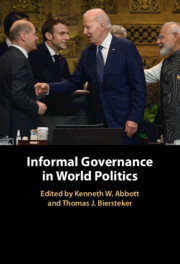
- Cited by 5
-
Cited byCrossref Citations
This Book has been cited by the following publications. This list is generated based on data provided by Crossref.
Hardt, Heidi 2024. NATO after the invasion of Ukraine: how the shock changed alliance cohesion. International Politics,
Panda, Jagannath and Ohn, Daewon 2024. Minilateralism and the new Indo-Pacific order: theoretical ambitions and empirical realities. Australian Journal of International Affairs, Vol. 78, Issue. 6, p. 767.
Snidal, Duncan 2025. How informal intergovernmental organizations facilitate cooptation and promote peaceful change in times of power rivalry. Contemporary Security Policy, Vol. 46, Issue. 1, p. 150.
Fawcett, Louise 2025. The changing regional faces of peace: Toward a new multilateralism?. Contemporary Security Policy, Vol. 46, Issue. 2, p. 372.
Legler, Thomas Martins, João Pedro and Iniestra, Anakaren 2025. The untold story: informal intergovernmental organisations in Latin America. Third World Quarterly, p. 1.
- Publisher:
- Cambridge University Press
- Online publication date:
- May 2024
- Print publication year:
- 2024
- Online ISBN:
- 9781009180528


